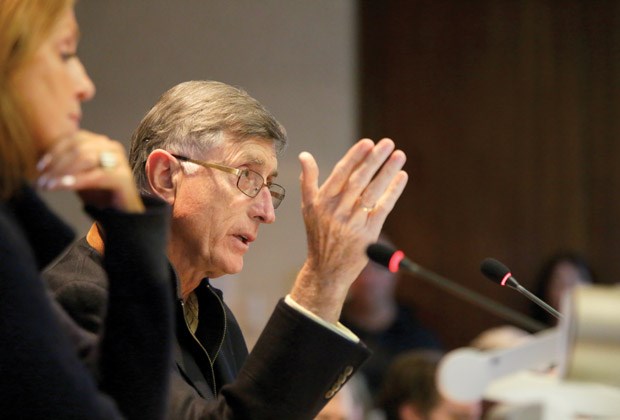After 30 years and three hours, West Vancouver is still searching for a magic bullet that works on monster homes.
The district kicked off at least two months of community consultation on the size, siting and character of single-family homes Monday with a contentious council meeting that drew legions of chanting West Vancouverites to chambers.
The chief concern among the majority of the crowd was a proposed temporary bylaw limiting the size of new homes. The bylaw was defeated 5-2.
“The current need for larger homes in West Van is really a reflection of how West Vancouver is changing. It’s not a cottage community anymore,” said Sam Whiffin, whose comments drew massive applause from the packed gallery.
A few of the evening’s speakers, which included several builders and developers, told council their actions would get them fired in the corporate world.
“This is not the corporate world. This is the government world and this is democracy,” responded Coun. Nora Gambioli. “We’ve been paving over paradise for a very long time.”
Gambioli and Coun.
Christine Cassidy were the only councillors to support the proposed bylaw, which would have limited new homes to being no more than 50 per cent bigger than the largest home on the smallest lot in the same neighbourhood zone.
The crowd interrupted Gambioli’s remarks by clapping in unison while chanting: “No!”
The chanters were quelled by Mayor Michael Smith. “If you want to make a noise, please do it out on the sidewalk,” he told the crowd.
Following the interruption, Gambioli told the gallery that continued development would rob West Vancouver of its charm and ultimately result in an economic downturn. “This will not be a sought-after place because it will look like other municipalities that have wall-to-wall homes and have no interesting neighbourhoods or any character or any heritage left,” she said.
One of the key problems is lot consolidation, according to Gambioli, who discussed an approximately 16,000-square-foot home on four lots that may be built across the street from West Vancouver secondary. That sort of development would have been limited by the temporary house size restriction, according to Gambioli.
Despite moving the bylaw, Coun. Michael Lewis spoke against it, characterizing the motion as “out of whack” with council’s timeline for consultation.
The measure, besides having potentially deleterious fiscal impact on property values, “pre-concludes” the result of the consultation process, according to Lewis.
Both Couns. Craig Cameron and Mary-Ann Booth cast their votes against the temporary measure.
Cameron termed it “too blunt an instrument” while Booth noted that it would affect every homeowner differently, and some of them unfairly.
Resident Russell Lane suggested the restriction would create “two classes of property.”
Cassidy supported the bylaw, telling the gallery property values are jeopardized by an onslaught of development.
“None of us want to kill the goose that laid the golden egg,” she said. “We’re tired of living in grey. Everybody wants a resolution to the issue.”
The resolution to the issue should be an equation, according to Sauder School of Business economics professor Thomas Davidoff.
Council should consider how much a resident would pay to build a bigger house versus how much a neighbour would demand in payment to give up the right to regulate the size of that neighbour’s home.
“What would be a bigger number?” Davidoff asked.
Davidoff’s comments are reminiscent of Oscar Wilde’s quote about the cynic who knows the price of everything and the value of nothing, according to Coun. Craig Cameron.
The tension is between community interests and individual freedoms, according to Cameron. “All of them are legitimate,” he said.
The issue of neighbourhood character came up repeatedly but eluded definition. One resident suggested most so-called monster homes are tasteful, beautifully appointed upgrades of creaking post-and-beam relics.
While the majority of the evening’s speakers chastised council for considering a bylaw that could hurt the real estate market and curtail the rights of property owners, a few residents were adamantly in favour of some sort of restrictions.
The razing of old homes has been destructive in some neighbourhoods, according to Liz Byrd. “If you take a house down it’s like a nuclear bomb site. Everything goes.”
Patrick Hill asked just what would be wrought by ever-escalating property values. “Good for the real estate crowd, not for the people who want to continue to live here,” he said.



